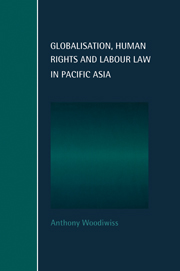Book contents
- Frontmatter
- Contents
- List of figures
- Acknowledgements
- CONVENTIONS
- Introduction: the ‘clash of civilisations’ and the problem of human rights
- PART ONE Against absolutism and relativism: towards a globally enforceable concept of human rights
- PART TWO Human rights, labour law and patriarchalism in Pacific Asia
- Conclusion
- Notes
- References
- Index
Introduction: the ‘clash of civilisations’ and the problem of human rights
Published online by Cambridge University Press: 07 May 2010
- Frontmatter
- Contents
- List of figures
- Acknowledgements
- CONVENTIONS
- Introduction: the ‘clash of civilisations’ and the problem of human rights
- PART ONE Against absolutism and relativism: towards a globally enforceable concept of human rights
- PART TWO Human rights, labour law and patriarchalism in Pacific Asia
- Conclusion
- Notes
- References
- Index
Summary
THE ‘CLASH OF CIVILISATIONS’ AND THE PROBLEM OF HUMAN RIGHTS
One of the few benefits of the Cold War was the creation of a compendium of human rights that appeared to be capable of commanding the assent of peoples across the globe. Thanks to the insistence of the Soviet Union and its allies, and using Sir Isaiah Berlin's (1969) terminology, the ‘positive’ social and economic rights associated with the socialist tradition were added to the largely ‘negative’ civil and political rights of the liberal tradition when the 1966 United Nations Covenants were formulated (Cassese, 1990). Apart from hugely broadening the array of human rights, the bargained nature of this outcome meant that the two traditions ceased to be mutually exclusive in the sense that their adherents now accepted, at least formally and pending ratification, that their human rights records should be judged against each other's standards. One might have expected, therefore, that with the ending of the Cold War, the scene was indeed set for the establishment of a New World Order premissed on universal respect for human rights.
PATRIARCHALISM AND THE POSSIBILITY OF ENFORCEABLE BENEVOLENCE
This has not turned out to be the case and this study is intended to offer both a contribution to the explanation of this state of affairs and a suggestion as to how a revival of the human rights project on a more equal civilisational basis that, because it assumes the hybrid nature of all societies (Bhahba, 1994), is neither Occidentialist (Carrier, 1992) nor Orientalist (Said, 1978) might yet become possible (see also, Wilson, 1996; Merry, 1996 and the ongoing discussion in Human Rights Dialogue).
- Type
- Chapter
- Information
- Publisher: Cambridge University PressPrint publication year: 1998



